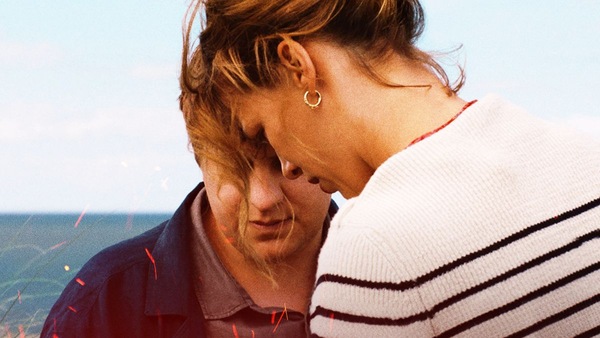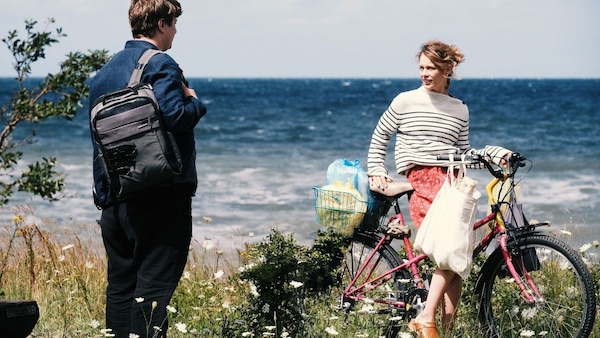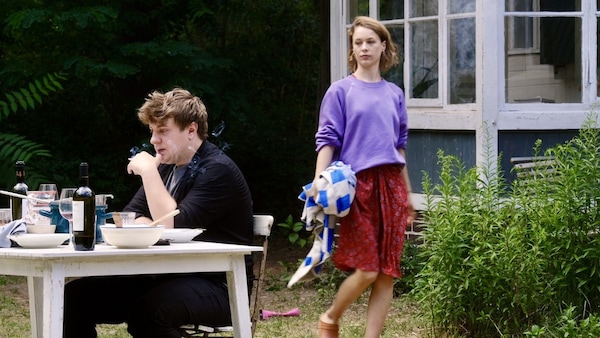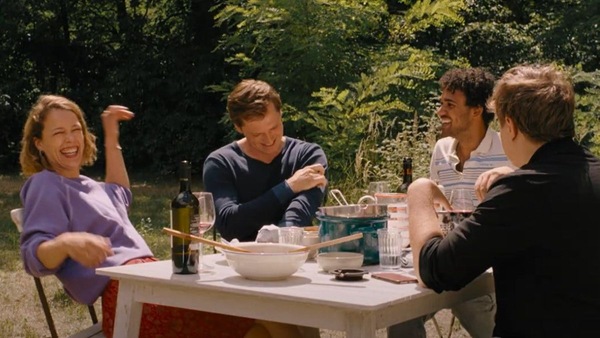Afire Is A Searing Portrait Of The Tortured Artist As An Insufferable Narcissist
Unlike most of Christian Petzold’s previous films, Afire focuses on Germany's present and what the future holds, with the whole world teetering on the edge of an all-consuming climate catastrophe.

Promo poster for Afire.
Last Updated: 11.39 PM, Apr 07, 2024
Our contributing critic Prahlad Srihari sampled the best among world cinema's most recent offerings at the Bengaluru International Film Festival (BIFFes). This is the third in a four-part series of reviews from the festival. Read Part 1 and Part 2 here.
*
BEING self-absorbed can be considered a precondition of the writing process. When you are indulging your point of view, your imagination, your fantasies and nightmares, how can you not be? If your work succeeds, it is your success. If it doesn’t, it is your failure. Of course, there are levels to writerly self-absorption, from reasonable to terminal. Leon, in Christian Petzold’s latest feature Afire, suffers from the terminal kind. Played with unwavering conviction by Thomas Schubert, Leon is a touchy-needy novelist who can’t see beyond himself. What’s worse is his self-absorption comes at the cost of a far more critical requirement for a writer: curiosity. He cannot engage with those around him without leaping from observation to judgement. He assumes more than he asks — which becomes a running gag of its own in the film. Even when he asks, the questions are often charged with thinly-veiled judgements. Leon is under pressure to deliver a worthy follow-up to his acclaimed debut novel. Only the new novel — lamentably titled Club Sandwich — is a disaster, a truth he knows but struggles to accept. After all, this is a man so trapped in his own head that he ignores the threat posed by an actual disaster closing in on him.
At the start and the end of Afire plays the Wallners’ dream pop melody 'In My Mind' — a fitting introduction indeed to its self-absorbed protagonist. “Love’s gonna make us, gonna make us blind,” sings the Austrian outfit. Love has been held captive by the storms of history and mythology in Petzold’s earlier films. But it isn’t the weight of Germany’s past that haunts the lovers and writers of Afire. It is the present and what the future holds, with the whole world teetering on the edge of an all-consuming climate catastrophe. The film is as much a tragedy about burning desires for a world in flames as it is a comedy about an insular writer for our insular age.

It is the dog days of summer. Leon has joined his photographer friend Felix (Langston Uibel) for a workcation by the Baltic Sea. Both have come with clear plans. Leon intends to polish up the final draft of his second novel before his editor (Matthias Brandt) drops by; Felix intends to complete his photography portfolio for an art school application. Upon arriving at Felix’s family holiday home, however, the two find the place is already occupied by a mysterious young woman named Nadja (Paula Beer). The easy-going Felix is anything but perturbed by the double booking; the irritable Leon, as you would expect, isn’t too happy sharing the house with another guest.
Nadja appears at first as a trail of leftover lasagna, unwashed dishes, and a pair of high heels. Before she is seen, she is heard through the paper-thin walls, as the passionate moans of sex in the adjoining room add to Leon’s discontent at night. Discontent turns into a voyeuristic intrigue from the very first glimpse he catches of her through the kitchen window. As he watches this attractive blonde woman in a red summer dress, whistling a tune, hanging her laundry, and riding into the woods on a bike, the look on his face is of a man smitten at first sight, even if he is too insecure to admit it. Nadja, by contrast, opens herself to the world, seeking connection wherever she can, whether by selling ice cream at the seafront or hooking up with the local lifeguard Devid (Enno Trebs). Beer lights up the screen as a free spirit, an observant young woman who thwarts Leon’s blinkered attempts to figure her out at every turn. There is never any doubt about her desires and her life that exist beyond the perimeter of his imagination, only if he had the curiosity to ask her about them.

Instead of taking up on Nadja, Felix and Devid’s daily invitations to the beach, Leon decides to isolate himself and withdraw into the shell of his self-enforced outsiderness. He is such a wet blanket he reminds them he has come there to work, not frolic. Once the trio leaves however, Leon procrastinates like any writer worth his salt: he bounces a tennis ball against the wall; dozes off in the gazebo; snoops around Nadja’s room, plays her records, goes through her diary and scurries back to his laptop to pretend like he has been working all along when he hears them return. Leon doesn't seem to enjoy the process of writing so much as the monastic privacy, the station, and the expectations it creates. Despite his own pretence, he looks down on Nadja and Devid for doing seasonal work. Petzold often frames Leon staring in judgement yet longing for validation from the safety of windows. Crosscut gazes between Leon and Nadja reveal she sees through him more clearly than he sees through her.

For a writer, Leon is painfully imperceptive. He fails to work out the romance brewing between Felix and Devid. When Nadja confesses to not liking his manuscript, he becomes incensed before withdrawing further. Later, when it is revealed she is a literary scholar, an embarrassed Leon views her and her criticism of the manuscript differently. Through Leon’s condescending questions about Devid’s job and his changing perceptions of Nadja, Petzold examines the bias against manual labour and the glorification of creative pursuits. Schubert is deliciously prickly yet tremendously watchable as Leon, loading an exhilarating charge into his judgements and sulks, only to reveal his male insecurities and misplaced arrogance. Real life, for writers like Leon, isn’t something to live and enjoy in the moment; instead, it is mere raw material for their fiction. As Leon suffers for his work, by choice, he makes those around him suffer as well — literary solipsism at its toxic worst but cinematic best.
Afire was screened at the 15th Bengaluru International Film Festival (BIFFes).
